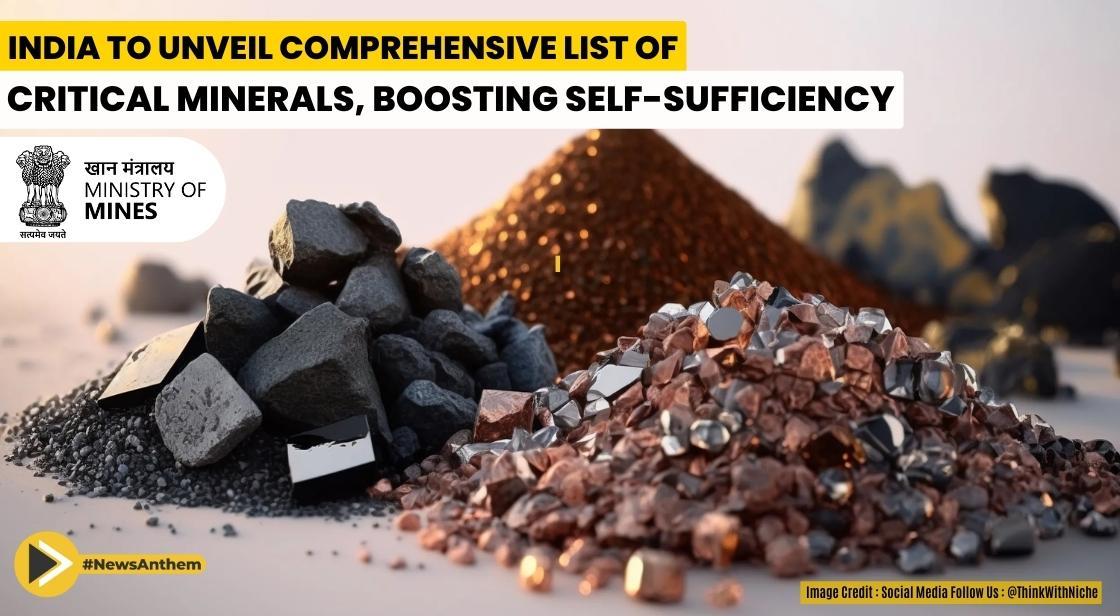India to Unveil Comprehensive List of Critical Minerals, Boosting Self-Sufficiency

News Synopsis
India's First List of Critical Minerals to be Released
India is set to mark a significant milestone in its pursuit of self-sufficiency and resource sustainability with the release of its first-ever list of critical minerals. The comprehensive list, scheduled to be unveiled by Union Minister of Coal, Mines & Parliamentary Affairs Pralhad Joshi, aims to address import dependencies, strengthen supply chain resilience, and support the country's net-zero objectives.
Addressing Import Dependencies and Enhancing Supply Chain Resilience
The release of the 'Report on Identification of Critical Minerals for India' signifies India's commitment to reduce reliance on imported minerals. The list has been carefully designed to identify and prioritize minerals that are vital for various industrial sectors, including high-tech electronics, telecommunications, transport, and defense.
By acknowledging the significance of these minerals and ensuring their availability, India aims to mitigate supply chain vulnerabilities and minimize price volatility.
Strategic Initiative to Strengthen the Mineral Sector
Experts view the introduction of the critical minerals list as a strategic initiative that underscores India's determination to fortify its mineral sector. The absence of a specific list of critical minerals had been a hindrance in prioritizing the country's mineral needs.
The forthcoming list will serve as a guiding framework for policy formulation, strategic planning, and investment decisions in the mining sector. This step is expected to enhance the resilience and competitiveness of India's mineral industry.
Role of Critical Minerals in Clean Energy Technologies
Critical minerals play a pivotal role in clean energy technologies, making them indispensable for the production of wind turbines, solar photovoltaic cells, electric vehicle (EV) batteries, and electricity magnets. As the global demand for clean energy technologies continues to surge, the inclusion of minerals such as copper, lithium, nickel, cobalt, and rare earth elements (REEs) in the critical minerals list highlights India's commitment to driving sustainable economic growth and reducing carbon emissions.
Addressing Supply Risks and National Security Implications
The compilation of the critical minerals list has been a collaborative effort between the Ministry of Mines and experts from the geology and mining sectors. The selection process considered the economic importance and scarcity of minerals, taking into account their significant national security implications.
The list aims to identify minerals that are essential for long-term security, mitigate risks associated with supply disruptions, and strengthen India's industrial competitiveness.
Evolving Nature of Critical Minerals and International Perspectives
The declaration of critical minerals is a dynamic process that can evolve over time. Technological advancements, market dynamics, and geopolitical considerations can influence the inclusion or exclusion of certain minerals from the list. Different countries adopt their own unique lists of critical minerals based on their specific circumstances and priorities.
For example, the US has declared 50 minerals critical, the UK considers 18 minerals critical, and Canada recognizes 31. India's focus on strategic development and management of its mineral resources reflects its commitment to ensuring long-term security and bolstering industrial competitiveness.
Conclusion
The release of India's comprehensive list of critical minerals marks a significant step towards reducing import dependencies, enhancing supply chain resilience, and supporting the country's net-zero objectives.
By prioritizing the availability of critical minerals for key industrial sectors, India aims to strengthen its mineral sector, mitigate supply chain vulnerabilities, and promote resource sustainability.
The recognition of the role of critical minerals in clean energy technologies further emphasizes India's commitment to driving sustainable economic growth and reducing carbon emissions.
You May Like









